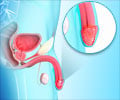According to new research, Scientists have developed a new technique to decipher how millions of individual cells are communicating with each other in small tumors grown in the lab, known as organoids.

‘The technique rapidly analyses each individual cell in an organoid, looking for the presence of specific signalling molecules - messages that cells send to neighbouring cells, telling them how to behave.’





This is the first time that scientists have been able to analyse many different signalling molecules at once in individual cells within replicas of patients’ tumours. Understanding how cells communicate could reveal how tumours are able to evade the immune system and become resistant to treatments.This could allow scientists to develop more effective new drugs, by revealing why tumours respond the way they do to treatments. It could also help doctors to select the best course of treatment for each individual patient, by testing treatments on a bespoke replica of a patient’s tumour before prescribing them.
The technique rapidly analyses each individual cell in an organoid, looking for the presence of specific signalling molecules - messages that cells send to neighbouring cells, telling them how to behave.
Dr Chris Tape, lead researcher of the study at UCL, said: "Organoids are already revolutionising cancer research by allowing us to test whether experimental new drugs are effective on lifelike models of tumours. But crucially, this new technique helps scientists to understand why a treatment works or not, by revealing in unprecedented detail how cells are talking to each other".
In order to listen in on cancer cells, the team grew organoids in the lab. These are self-organising 3D structures made up of cancer cells alongside other types of cells, such as immune cells and connective tissue. They mimic the behaviour of cancer in the human body much more accurately than cells grown in a dish.
Advertisement
The researchers tested this technique in bowel cancer cells and were able to simultaneously detect 28 key signalling molecules, across 6 different cell types, in over 1 million cells. They found indications that the cancer cells themselves, as well as immune cells and connective tissue, had ’rewired’ the normal signalling networks of bowel tissue, allowing tumours to grow unchecked.
Advertisement
Dr Emily Armstrong, research information manager at Cancer Research UK, said: "Having a better understanding of this complex communication between cancer cells and other types of cell that make up a tumour could reveal secrets of how cancer comes back after treatment and spreads around the body.
"While this technique is in the early stages of development right now, in the future we may be able to grow replicas of individual patients’ tumours, to identify early signs that a drug won’t work for them so we can personalise their treatment plan. We hope this could one day help more people to survive cancer".
Source-Eurekalert








